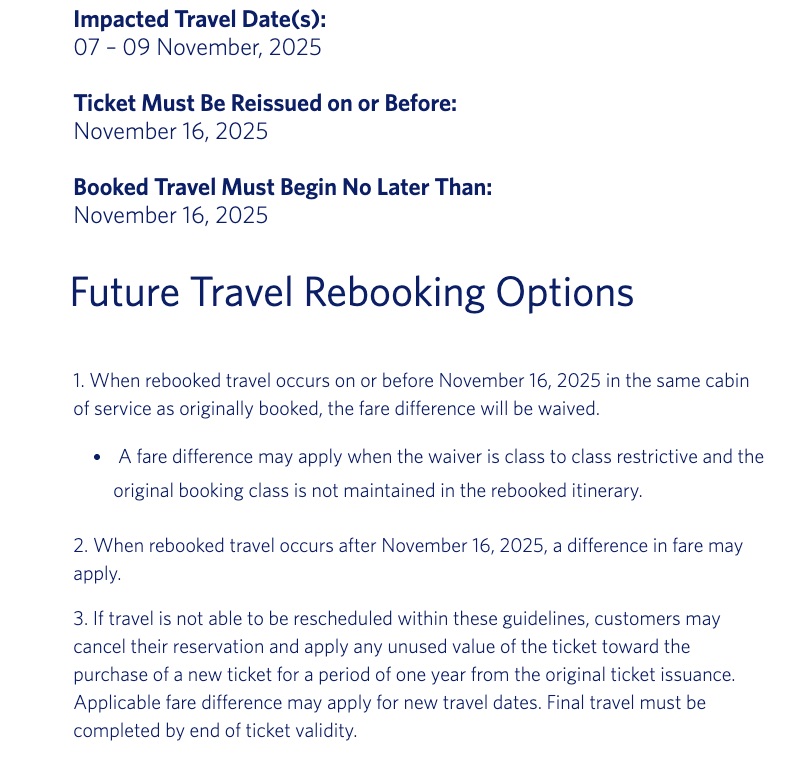Airlines will cancel thousands of flights through the weekend under an unprecedented federal government directive, casting doubt on millions of Americans' travel plans in the days ahead … and causing alarm looking ahead to the busy holiday travel season.
U.S. Secretary of Transportation Sean Duffy announced the plan late Wednesday to cut up to 10% of flights from 40 major U.S. airports starting on Friday. It's just the latest move amid mounting air traffic controller shortages that have already led to tens of thousands of flight delays as the shutdown stretched past the 35-day mark to become the longest in U.S. history.
We've heard from countless travelers in the last 24 hours wondering what flights could be cut, what they can do, and when this drama might end. If you're one of them, here's what's happening and what you can do now to prepare.
Don't Panic (Yet): Wait & See
Airlines are scrambling to rework their schedules to meet the FAA's quota for cuts, trying to limit the disruptions to travelers in the days and weeks ahead.
It's a tall order.
Airlines' hub-and-spoke networks mean that one cancellation often has a ripple effect, leaving planes and crews out of place and causing several more downstream delays and cancellations. Plus, years of meltdowns and mass disruptions have shown that airlines' IT systems may strain, even buckle under the weight of processing all these changes on the fly.
So while the federal government has mandated cancellations at 40 airports, the disruptions could spread far wider. Here are those 40 airports:
- Anchorage (ANC)
- Atlanta (ATL)
- Baltimore (BWI)
- Boston (BOS)
- Charlotte (CLT)
- Chicago Midway (MDW)
- Chicago O'Hare (ORD)
- Cincinnati (CVG)
- Dallas Love (DAL)
- Dallas-Fort Worth (DFW)
- Denver (DEN)
- Detroit (DTW)
- Fort Lauderdale (FLL)
- Honolulu (HNL)
- Houston Hobby (HOU)
- Houston-Bush Intercontinental (IAH)
- Indianapolis (IND)
- Las Vegas (LAS)
- Los Angeles (LAX)
- Louisville (SDF)
- Miami (MIA)
- Memphis (MEM)
- Minneapolis-St. Paul (MSP)
- New York City (JFK)
- New York City LaGuardia (LGA)
- Newark (EWR)
- Oakland (OAK)
- Ontario (ONT)
- Orlando (MCO)
- Philadelphia (PHL)
- Phoenix (PHX)
- Portland (PDX)
- Salt Lake City (SLC)
- San Diego (SAN)
- San Francisco (SFO)
- Seattle (SEA)
- St. Louis (STL)
- Tampa (TPA)
- Teterboro (TEB)
- Washington D.C. Regan (DCA)
- Washington D.C. Dulles (IAD)
But exactly which flights will be cut and which will be spared is still up in the air. And again: The disruptions could easily spread far beyond these 40 major U.S. hubs.
All three major U.S. airlines have stated their long-haul international routes will continue flying as normal – though connections could still cause problems for travelers heading abroad on a one- or two-stop journey. American and United have both stressed that they'll minimize (or avoid altogether) cutting core hub-to-hub flights – think Denver (DEN) to Newark (EWR) or Miami (MIA) to Philadelphia (PHL) – and instead focus on shorter regional flights.
Watch Your Flights (& The News) Like a Hawk
There's no telling what'll happen with flights this weekend … let alone a few weeks from now. While there are few signs that the shutdown could conclude anytime soon, a deal between Congress and the Trump administration could break through quickly and dispel any doubt clouding travel.
So watch the news, monitor headlines, and stay tuned.
If you're flying anytime soon, you need to be extra vigilant.
In the days leading up to your flight, keep tabs on Flight Aware's Flight Cancellations dashboard, which will show you airline-by-airline statistics on flight cancellations and delays from yesterday and today. It's also a good idea to monitor your flight on your airline's website, smartphone app, use a great tracking app like Flighty, or plug your flight number into a site like FlightRadar24.com.
While you should watch your inbox, airlines don't always automatically notify customers when they've made a change to flights. These tools can help you get the news faster.
Know Your Rights, Get a Refund & Watch for Waivers
In the U.S., air travelers just don't have many rights. But one is tailor-made for this moment.
If an airline cancels or significantly delays your flight, you can scrap the reservation for a full refund – not just an airline credit that may expire in a few months, but your money back.
And it doesn't matter whether your flight was disrupted due to air traffic control shortages, bad weather, or an airline issue. If the flight gets canceled, you can get a refund and start over.
Flight not canceled, but continually getting pushed back? The cutoff to trigger a refund is a delay of more than three hours for a domestic flight, or six hours for an international flight.
Read more: Airlines Must Now Give Automatic Refunds for Flight Delays, Cancellations
Airlines have begun issuing waivers that allow passengers to change their flights by up to a week or more without paying fees or fare differences. For example, Delta is allowing anyone with flights booked through the weekend to rebook their trip through next Sunday, Nov. 16, without additional fees or fare penalties.
United said it would go a step further, allowing some customers to cancel flights for a refund “even if their flight isn't impacted.” That policy allows anyone booked to travel over the next week from eight U.S. airports – including all its major hubs, plus Cleveland – to cancel for a full refund instead.
Beyond that, don't expect airlines to help you out if you're caught in the mess.
Disruptions caused by air traffic control are typically deemed “uncontrollable.” Unlike controllable delays or cancellations caused by maintenance or airline crew issues, carriers aren't obligated to provide meal or hotel vouchers to passengers stuck for hours, even overnight.
That's where travel insurance – or a good travel credit card with built-in coverage – can be a lifesaver.
Check Your Travel Insurance (Or Credit Card)
Preparing for the worst all starts from the time you buy your tickets.
Maybe you bought a travel insurance policy – that might help cover some of your additional costs if plans change. But what about the trip delay and cancellation coverage that comes with top-tier travel rewards credit cards?
Both the *chase sapphire preferred* and the *chase sapphire reserve* offer some of the best travel protections of any cards on the market. On the Preferred Card, for example, you get:
- Up to $500 in reimbursements for expenses like airfare, hotels, meals etc. in the event of a delay of 12 or more hours.
- Up to $100 a day for five days if your checked baggage is delayed more than six hours.
- Unbeatable coverage for rental cars
- And more…
But the devil is in the details. Chase's guide to benefits states that “a covered hazard includes equipment failure, inclement weather, labor strikes, and hijacking or skyjacking.” Whether or not a government shutdown and FAA-ordered flight cancellations fall into one of those buckets is unclear. I think a case could certainly be made that the current Air Traffic Control (ATC) staffing shortages constitute a form of “labor strike,” but it's unclear whether Chase's benefits administrator will agree.
Either way, you'll need to read the fine print to determine exactly what you'll be covered for … and what you might not be. Trust us: It's better to know what you're entitled to beforehand. Do it now.
Read more on the best credit cards for travel insurance!
You've Got to Be Kind
This is hard, we know. But when things go wrong in air travel, we have a mantra:
“It's not the check-in agent's fault. It's not your TSA agent's fault. It's not your flight attendant's fault. And it's not the customer support agent on the phone's fault, either.”
As frustrating as delays and cancellations can be, don't take it out on front-line employees. In many cases, they're under just as much stress as you are, trying to help hundreds of fellow travelers – not to mention working long hours trying to keep the airline moving.
Kindness is a superpower in these situations. These employees often have enormous power to help you out … and they're far more likely to do so when you're genuinely nice.
Bottom Line
If you're traveling in the days ahead, the time to act is now.
Monitor your flights flights closely, know your refund and rebooking rights, and prepare flexible travel plans. Above all, stay patient and kind to airline and airport staff who are doing their best to survive the chaos and get you where you need to go.








Thanks, Jackson for your helpful hints concerning this situation…
I would like to know if something different would happen in case the flight tickets were acquired through miles redemption with a frequest flyer company.
Keep well,
Ana.
Hi Jackson,
We had tix for Msp to Den flying today (Fri) returning Monday on Delta in Basic seats. But when we tried to check in yesterday 23 hr 59 min before our departure, we were unable to select seats for my wife, our 3 yr old grandchild and myself. The online message said “seats assigned at gate”! So I phoned Delta and was told by a human that we would be STANDBY! And indeed, we’d wait in line for the gate agent to assign seats. I said that seems counterintuitive when it is unrealistic to have our grandchild separated from at least one of us. I was told I could cancel for a full refund, so I did. Looks like that flight is expected to be ontime (scheduled for departure 30 minutes from now) but it’s still a gamble whether we would have been able to fly back on Monday. Just thought I’d share this with you. Thanks for listening 🙂